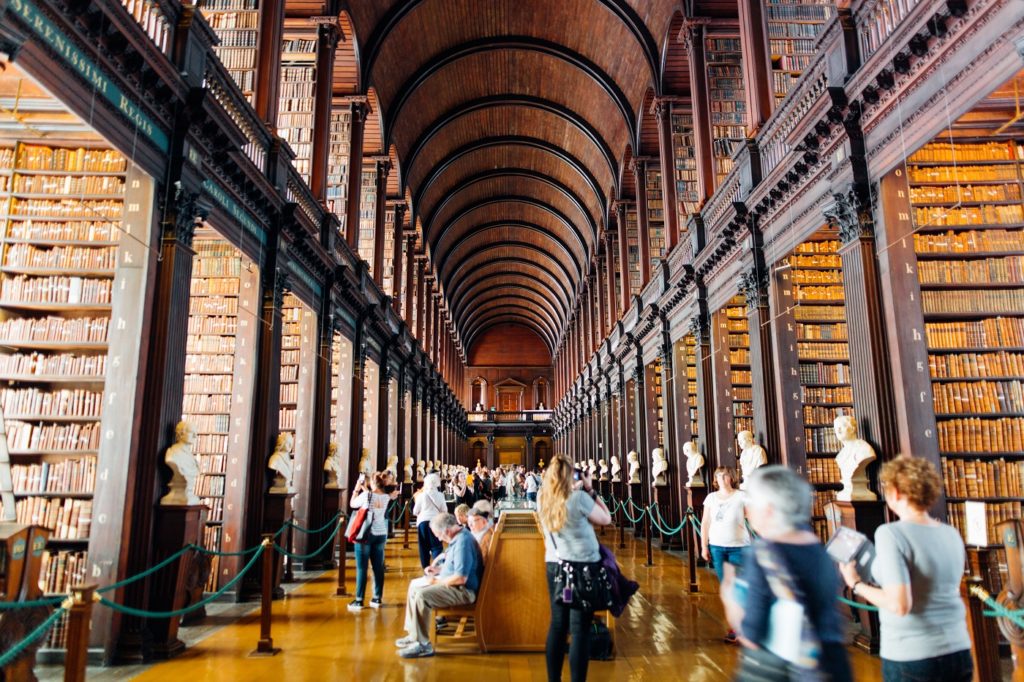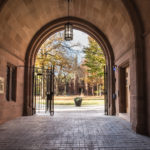Much in culture right now inclines toward the apocalyptic. While conservatives are very good at criticism, we’re not as good at gratitude and appreciation or at building on our strengths. We’re inclined to observe national politics and be depressed or angry, to lament the degeneration of culture, to see in academia administrative bloat and the overreach of diversity enforcers. All of this is real, and shouldn’t be ignored. Criticism is warranted. But more important than criticism is building and rejuvenation, as Yuval Levin has argued.
Especially (but not only) among conservatives of the under-40 set, I have observed a tendency to catastrophize—to imagine that our historical moment is uniquely awful. If this is true, the argument goes, then we must react in a dramatic way, perhaps by undertaking a counterrevolution. Allan Bloom gave voice to this crisis mentality more than thirty years ago in The Closing of the American Mind, and it does not seem that things have improved much since then.
Or perhaps conservatism exists in a permanent crisis, and things have always been difficult for those who want to preserve not only the idea but the practice of liberal education. Michael Oakeshott, writing in 1949, observed that human beings are always inclined to “look back at earlier periods in the history of our civilization and ascribe to them a world-picture far more coherent than they actually possessed, . . . and we attribute to ourselves a fictitious degree of insecurity.” What we now see in the ascendance of critical theory may be only the latest iteration of a never-ending problem—namely, that human beings have always been practical in orientation, and they are also increasingly political; but liberal learning at its best is neither practical nor political. It must defend its supposed “purposelessness” afresh in every generation.
Yet a defense does not have to capitulate to the spirit of the age. We do not need to begin from the ground up with a new rationalist plan; instead, we should draw on our reserves. “Leisure is the condition of considering things in a celebrating spirit,” writes Josef Pieper, and this is an ancient vision worth reclaiming. Expressing such a vision requires “energetic sobriety” in finding “a way to be at home in the world,” as longtime Colorado College professor Timothy Fuller has suggested. Such a vision should reflect not anger and reaction, but instead quiet confidence.
Start your day with Public Discourse
Sign up and get our daily essays sent straight to your inbox.Readers of Public Discourse have already been treated to a series of essays about liberal education by people who know what they’re talking about, and two recently released books present the life of the mind in sparkling, enticing ways (without the tedious “the classics are good for you” platitudes). Zena Hitz’s Lost in Thought is a winsome personal account of her own intellectual journey, and Alan Jacobs’ Breaking Bread with the Dead: A Reader’s Guide to a More Tranquil Mind offers a smart and often humorous defense of reading old books amid the crushing weight of too much technology and too much information.
These are only the latest contributions to our resources, which are extensive. We all now have immediate, online access to the entire western tradition of philosophy, art, music, science, and literature. Far more important than mere access, many conservative intellectuals are experts in these fields, ready to teach, mentor, and converse. And multiple existing institutions—universities, think-tanks, and other non-profits—already aim at preserving and revitalizing the traditional idea of liberal education. Many young men and women are thirsty for this authentic experience of learning. In short, we already possess the seeds of cultural renewal; we must plant them creatively and fruitfully. I want to suggest ways we might do this, and highlight a few places where this renewal is already going on.
In the fall of 2018, Baylor University’s Honors Program piloted what we called the “Foundation Year,” loosely based on the program that a Canadian school, Augustine College, has provided for over twenty years. Augustine College offers a one-year course of study, in which the first term covers the ancient world up to the Reformation; the second term, Reformation to the twenty-first century. In one intensive year, students receive a comprehensive introduction to the western tradition. As the website’s copy dryly notes, the college’s program is “undiluted by electives, majors, job training, university-style attention to hot topics and the latest knowledge, . . . and completely unwilling to be all things to all comers.”
Augustine’s program is an exciting and systematic trek through history: students read Plato, for example, and simultaneously study Greek red-figure pottery and the development of the Hebrew Bible. Concurrent courses in music, Scripture, art, philosophy, and history mean that what a student learns in one class he can see reflected in the others. This provides the beginning of a sense that knowledge and human experience might just be unified in a “circle of knowledge,” as John Henry Newman put it, not rigidly divided into the discrete subjects of the modern university. And the focus is on discovering life’s meaning by learning to recognize one’s place in a rich and storied tradition.
The Baylor Foundation Year mimicked Augustine’s program as best we could. In the Fall semester we taught ancient to medieval philosophy and political philosophy, art, and literature, plus an intensive course on the Old Testament. In the spring, we moved into modernity in all these courses, plus a careful reading of much of the New Testament. Classes were small and discussion-based, with plenty of time for socializing outside of class. Until the program was criticized for not being sufficiently diverse (we were three men and one woman, with no faculty of color) it was a great success.
Other people are also developing similar ideas to promote liberal learning outside the university context, both large-scale online and small-scale local. One notable local initiative is taking place right now in Waco, Texas, where I live. Following in the tradition of other, more established fellows programs like John Jay and Falls Church, the three-year-old Brazos Fellows program at Christ Church is an intentional community of young people who gather for a year to study and pray in a traditional Anglican church setting. They read Augustine, Aquinas, George Herbert, Flannery O’Connor, Karl Barth, Tertullian, Athanasius, and many others. But the program is not “merely” academic: its aim is for each fellow to develop a rule of life that is also spiritual and embodied, in community with others.
One other notable experiment is taking place at Thales College just outside Raleigh, North Carolina, which will admit its inaugural class in the Fall of 2021. Named after Thales of Miletus, the College’s primary mission is to foster authentic liberal learning paired with moral formation and fiscal responsibility. Thales’ model relies on students reading material or watching lectures produced by Thales faculty and nationally renowned scholars in advance of class. Courses will consist of intensive, seminar-style discussions in addition to Oxford-style one-on-one tutorials, in which faculty will tailor assignments to each student’s needs. To foster financial independence, students will be placed in paid internships, which are expected to cover most of the cost of tuition. The entire curriculum will take approximately three years to complete, and at a total cost of around $30,000 will be about half the average yearly tuition at a private university.
These opportunities for authentic and formative liberal learning increasingly exist outside the system of accredited universities. While there will always be a few faculty members in most universities who understand the non-career, non-social-justice purposes of liberal learning and convey it to their students, it does not hurt to have the parallel world of summer institutes, fellows programs, and other alternative “delivery systems” to preserve the kind of education most of us think so important.
Still, perhaps the most pressing question is why we should be troubling ourselves about this when much of the world—even the world of academia—seems to be moving in a very different direction. One university administrator recently admitted that he did not mind eviscerating the liberal arts programs at his school: “The first cost-cutting measures [we need to employ] are those that have little effect on academic life,” which means “shifting priorities away from the value of a liberal arts education and focusing on degrees that pay.” We are all familiar with this line of reasoning, and we all understand it. Nevertheless, I think there are two reasons for pursuing liberal learning that transcend both the usual clichés and the practical and political considerations that are foremost in the minds of many administrators. The first is justice, and the second is gift.
I am borrowing the idea of justice from education professor Darryl De Marzio, who has proposed that it might actually be unjust not to offer liberal education to young people, or for that matter, to anyone who wants it. Justice demands, De Marzio writes, “that we treat the human being (the student) as . . . a self-interpreting being,” as a person who understands himself in a variety of ways that become clear only in the activity of learning. If people are more than wage-earners, then they must see that all of life is not about the practical activity of getting ahead. If they are more than political actors, then we must have education that is not expressly political. In other words, if we want to “do justice” to the total human condition, we must explore all the things that comprise the liberal arts: religion, philosophy, art, music, and literature. This kind of study frees us from the chains of practicality, convention, and work, into the leisure that is appropriate for a human being. We do justice when we offer these opportunities to others.
Yet it isn’t only justice that makes us want to share what we have. Those of us who are fortunate to be immersed in something that we love—painting, music, poetry, even the scientific observation of nature—know that our interest opens out infinitely into more profound and extensive pleasures. It may sound effete to say it, but after some period of apprenticeship we may even become connoisseurs. And I hope we would want to share this gift of insight. “Who, indeed, possessing this quality of radiance, could resist a yearning to exercise it for the benefit of others?” writes Emile Jaques-Dalcroze. “The more joy we inherit, the more we are tempted to impart it among those to whom it has been denied.”
It is deeply rewarding, even fun, to realize (for example) that there is no single perfect recording of a Bach prelude and fugue. Every artist’s interpretation reveals something about the piece that we had not heard before, some little articulation or turn of phrase, rubato, or dynamic shading. The collection of notes that lies inert on the page is transformed into a source of joy and delight through human art, in both performer and listener. But this delight only comes in a process of learning. Until we know a little something about Bach, all of it will sound very much alike and may even be opaque to us. And the same goes for so many serious and meaningful human pursuits: we must be guided to them and through them by a person who already knows and loves them. Newman has it right: “The philosophical habit of mind . . . is like a fire caught by those who desire insight from those who have attained it.” To receive this knowledge and guidance is a most valuable gift.
If we think about liberal education in these ways, then not providing it to those who desire it is actually doing them a disservice. So far from being either unnecessary or a luxury, this education is precisely what allows us to be most thoroughly human. It is also counter-cultural in the deepest way. In pursuing it we are not distracted by the Sirens of political or cultural warfare, or by the background noise of outrage and anger that keeps us constantly on edge. Our task right now is to think creatively about opportunities for liberal education in our present situation, and then to take action so that we might make these opportunities real for those who follow us.















